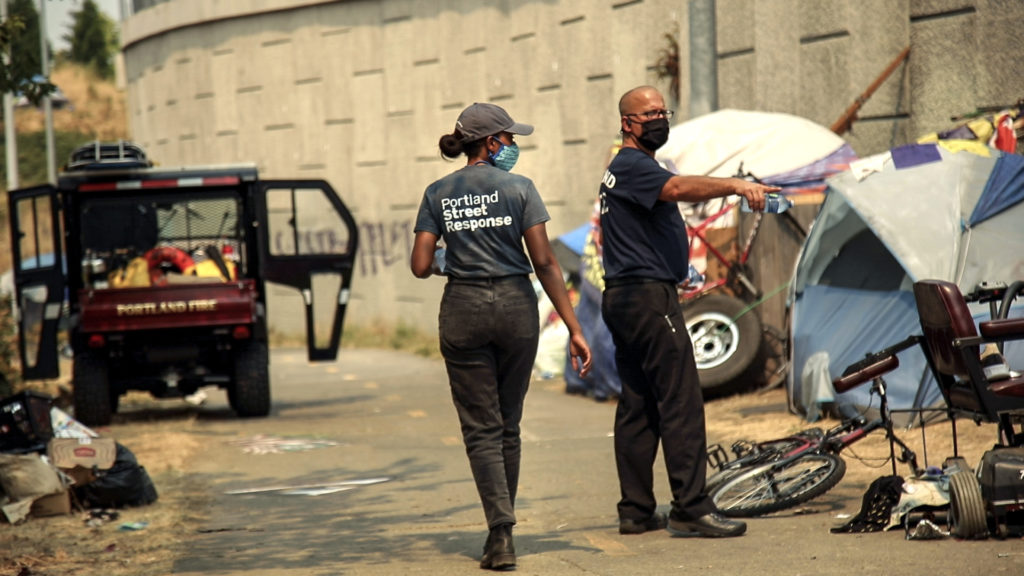Portland, OR
Portland Street Response – Portland, OR
May 27, 2022
The Portland Street Response (PSR) Team is a trauma-informed community response team embedded within Portland, Oregon’s Fire and Rescue Department. PSR is dispatched through the city’s independently run 911 call center, the Bureau of Emergency Communications (BOEC), which also dispatches calls to police officers, the fire department, and medical transport. The community responder program recently completed its pilot phase, which began in February 2021, and has now expanded citywide as of March 28, 2022. PSR primarily focuses on assisting people who are experiencing homelessness or behavioral health conditions, as well as diverting individuals away from jails and emergency departments to lessen the burden placed on emergency responders.
The following information outlines PSR’s efforts since it began; it follows the sections of the toolkit. Readers can connect to other parts of the toolkit by clicking the headers for more details.
Photo Credit: Portland Street Response
Community Engagement and Collaboration
- PSR staff engaged more than 350 community members in activities during the first 6 months of the pilot program. This included de-escalation trainings, door-to-door canvassing to raise awareness, and efforts to keep unhoused people and other community members safe during the record heatwaves of summer 2021.
- PSR staff also worked with the Street Roots Ambassador Program—a nonprofit media organization that works with people experiencing homelessness—to conduct surveys with 159 unhoused community members living in the Lents neighborhood, where the pilot program originally operated.
- PSR staff conducted five interviews with people who received services during the pilot to glean information about their experience with the program and used this information to inform program efforts during the expansion.
- PSR partnered with Portland State University’s Homelessness Research and Action Collaborativefor an external program evaluation. Program outcome updates were publicly available throughout the pilot phase, including the six-month evaluation, which can be found in the October Portland Street Response report.
- When not responding to calls, PSR staff perform outreach activities in the community, including hosting “pop-up events” in partnership with local community-based organizations and leading crisis de-escalation and mental health first aid training among various businesses.
Call Triaging
- Individuals can be connected to PSR by calling 911 or Portland’s non-emergency line. Portland 911 dispatchers ask a list of questions to determine which response is most appropriate—either police, fire, PSR, or ambulance services.
- Calls are identified by scenario rather than call type. Currently, PSR is dispatched when a caller reports that:
- A person is experiencing a mental health or substance use crisis and is outside or inside of a publicly accessible space.
- A person is outside and on the ground.
- A person is outside and yelling.
- A person needs a referral for services but does not have access to a phone line.
Program Staffing
- Each PSR team is composed of two to three individuals: a community health medic (which is an emergency medical technician [EMT] who is trained in basic life support and medical care), a licensed mental health crisis responder, and a peer support specialist who rotates on and off the response team to provide aftercare support. In addition, PSR has two community health workers who provide intensive case management and aftercare support and who coordinate community engagement and outreach.
- The EMT can administer non-emergency medical aid, and the other team members can assess whether additional care is necessary and refer clients to other services depending on their needs. The community health workers have also assisted individuals in securing housing.
- As of March 28, 2022, PSR started operating citywide from 8:00 a.m. to 10:00 p.m., 7 days a week.
Use of Data to Inform Decision Making
- PSR calls and other related data are published on the Portland Street Response Data Dashboard.
- Data sets include performance metrics such as:
- Call volume and location,
- Co-response times,
- Client demographics,
- Client outcomes,
- Community insights, and
- A heat map of call density by location.
- Qualitative outcomes are collected through interviews and shared via social media.
Safety and Wellness
- PSR teams travel in recognizable vans with logos, stocked with first-aid supplies, water, naloxone, hygiene items, and other survival tools such as tents and blankets.
- PSR teams are only dispatched to incidents where there is no threat of violence, no weapons are reported present, and the person is not in a private residence.
Financial Sustainability
- PSR is funded through the city’s general fund. The city council unanimously supported allocating $4.8 million of ongoing, annual funding for the program.
- The current cost estimates to operate the 24/7, citywide operation are approximately $9 million for Fiscal Year 2022-2023. A full rollout would also create approximately 60 full time positions.
Legislation to Support Community Responder Programs
- PSR was originally created from a working group formed by the Office of the Mayor and Portland City Commissioner Jo Ann Hardesty. It was later expanded through legislation during the 81st Oregon Legislative Assembly – 2021 Regular Session in HB 2417.











